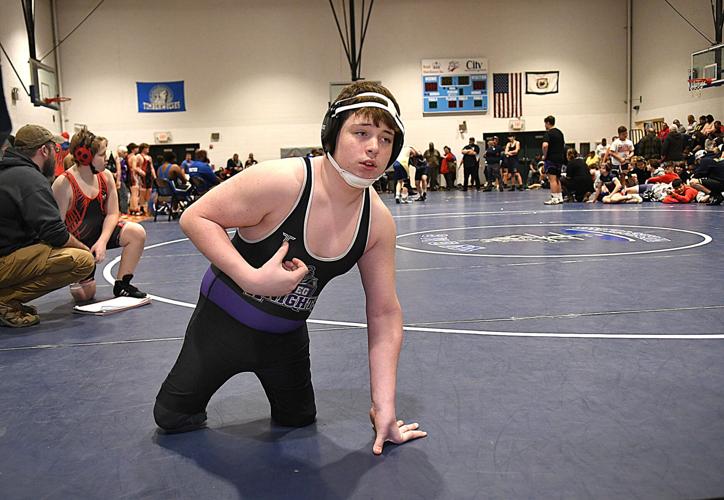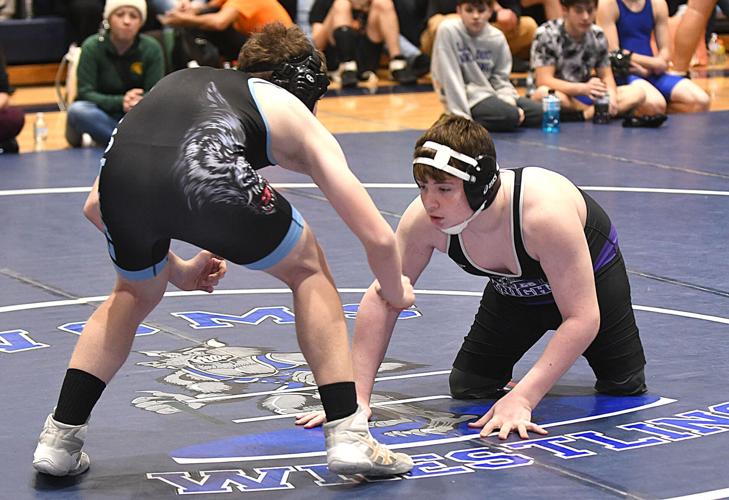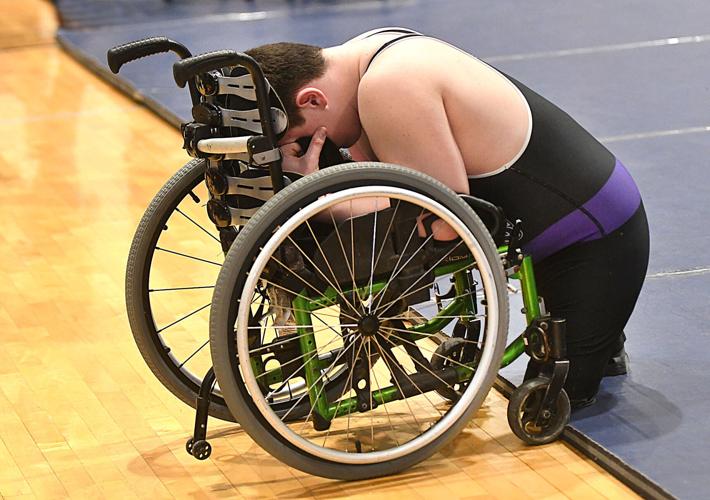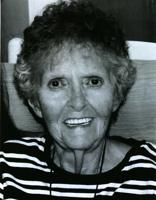Cameron Wiley is different.
That much is plain to the naked eye. His legs were amputated at the age of 5. He gets around in a wheelchair or, if he feels like it, on prosthetic legs.
But that’s where the differences end. Now a sixth-grader at Eastern Greenbrier Middle School, he does everything any other kid his age does.
He plays video games — Fortnite is his favorite. He even rides four-wheelers, something he did for the first time on his fourth birthday.
A typical day at school for Wiley is a typical day at school for anyone else. He goes to homeroom. He goes to the usual classes. At lunchtime, he takes care of his tray on his own.
That’s because that’s the way he wants it. Wiley has never used his condition as an excuse for anything. He wants to be treated the same as his peers, for better or worse.
“I don’t like pity,” Wiley says.
Really, this way of life is largely all he has known.
l l l
Wiley was born with arthrogryposis, a condition marked by contractures, or a permanent tightening of the baby’s muscles, skin and tendons that makes the joints short and stiff, according to the Cleveland Clinic website.
Sara Frazier, Wiley’s mom, said she was told the condition “typically affects the whole body, (but) in Cameron’s case, he got lucky that it just affected his legs.”
Because of the position of Wiley’s legs, Frazier — who was 25 weeks along — had to be airlifted to Roanoke Memorial Hospital and Wiley was delivered via cesarian section.
Wiley’s condition did not improve, so doctors performed surgery in an attempt to straighten his legs. When the procedure didn’t have the desired result, Frazier was eventually faced with the difficult question of whether or not to have her son’s legs amputated.
Part of her wanted that decision to be made by him, since his life would be the one most impacted.
“That was kind of a situation I was put into — was I making the right decision, or was I making the wrong decision?” Frazier said. “I wanted Cameron to make this decision, but they told me for him to be of sound body and mind, he had to at least be 13, and if we waited that long it would be 10 times harder on him.
“So I was left with the decision — should I leave him alone and let him be wheelchair-bound? Or should (we) amputate, hope he can walk, or is he still going to be stuck in that wheelchair?”
Frazier opted to go on with amputation. The surgery was performed in November of the year Wiley was supposed to start kindergarten. With anticipation of a six-week post-surgery rehab process, she chose to wait a year before sending him to school.
To be expected, there was trepidation on the part of the 5-year-old Wiley, who was getting around on prosthetic legs. But Frazier was there to encourage him all the way.
“I can honestly tell you his first two years of school were hard on Cameron. He didn’t want to go, and that’s because he was different,” she said. “I always told him, ‘Cameron, there’s nothing you can’t do that anybody else can do. Son, you can do it better.’”
It helped that his classmates accepted him from the start. They even found what was different about him to be cool.
“He’s had a couple kids ask him what’s happened to his legs, and he’ll look up at me if I’m around or he’ll look at a teacher to do his best to explain why he is the way he is,” Frazier said.
“But all the kids in elementary (school) thought of Cameron as the coolest kid because he had robot legs.”
Other than his fear of how the other kids might react, Wiley didn’t seem to have any other difficulties with his situation.
“It wasn’t that hard,” the quiet Wiley said. “I was hard-headed.”
Determined is probably a more accurate description.
l l l
Now 13, Wiley started middle school in August, and that was when worry crept in for Frazier. Wiley was going to have a whole new group of classmates and she wasn’t sure what their reactions would be.
“That was the reason I backed off of him because of his (prosthetic) legs,” Frazier said. “I said, ‘We’ll take sixth grade, you be you.’ I said, ‘Let the kids get a feel of you and who you are, that you are different. And then seventh grade, they all know you, you’ll have a support system and backup when you do put your legs on.’”
The use of his prosthetics has indeed been a point of contention between mother and son. Right now, Wiley seems dead set against using them — even using the word “never.”
“I don’t know. I just don’t like them,” he said. “They’re uncomfortable.”
“I have tried pressuring Cameron since he got his first set of legs to walk, but I’ve kind of just got to the point, he’s not going to do it if he doesn’t want to do it,” Frazier said. “So we’ve kind of backed off on him and when he’s ready, he’ll put them on and go. I feel like it’s (going to be) when he gets into girls, and when it’s time to drive. Right now his quick way of getting around is on his butt, let’s put it that way.”
l l l
Not using his prosthetics and moving around with the use of his arms has actually increased Wiley’s upper body strength, something that comes in handy for his latest venture.
Wrestling.
“Cameron had actually asked me a couple of years ago about wrestling and I was scared, because Cameron actually does not have hip sockets. He actually sits with his spine, let’s put it that way,” Frazier said. “I was always scared, he gets out on that mat and if somebody pull his legs too hard, how bad are they going to hurt him? So I guess you could say I kind of talked Cameron out of it.”
Later, Wiley told his pediatrician he was interested in wrestling.
“She asked my concerns and I told her. And she said, ‘If he wants to do it, let him do it,’” Frazier said. “And he asked me this year, ‘Mom, can I wrestle?’ And I said, ‘Go for it. If you want to do it, we’ll do it.’ And he fell in love.”
Eastern Greenbrier head wrestling coach Mike Honaker has found Wiley to be a source of inspiration.
“I just happened to go to school one day to see what kids were interested in wrestling,” he said. “One of the administrators brought him to me. They just didn’t see him involved in things. They didn’t see him getting out of the wheelchair. He wasn’t showing an interest in a lot of other things.”
But wrestling was something he was very interested in.
“I just want to lose weight. And get better at wrestling,” Wiley said. “I thought it would be a good sport.”
A large source of inspiration for Wiley has come from teammates Cassidy Vance and Carter Webb. Vance “wrestles you like a man, doesn’t she?" Frazier said to her son.
“I get very emotional, because I’ve watched his sister play softball, basketball. His little brother (plays) football and baseball. I was always scared there would never be a sport for Cameron,” Frazier said. “And seeing him do it just amazes me. Every time he gets on that mat, my heart races and I get emotional.”
Wrestling is considered by many to be the toughest sport there is, which seems to fall in line with Wiley’s determination to be treated the same as everyone else.
“Cameron is a great young man who wants to compete and doesn’t want anyone to let him win or take it easy on him,” Honaker said. “We work just as hard with him and just as intensely with him as we do with all of our wrestlers.”
Wiley said his opponents’ biggest advantage over him is their height, but he has learned how to try to overcome that.
“I grab their arms and pull myself towards them,” he said.
Despite his disadvantage, Wiley was able to win two matches this season, including a 16-0 technical fall.
“I was happy,” he said, understatedly.
Frazier, on the other hand, was “very emotional. I high-fived him and ran outside to call his dad.”
“(He’s) just a sixth-grader, so he’s got a couple years of middle school wrestling ahead of him,” Honaker said. “We’re real excited to see where this is going to go with him, because he is a very coachable young man, and that’s what we’re looking for.
“He’s going to overcome whatever disadvantage you may perceive that he has, and he’s going to surprise a lot of people in the future.”
l l l
With the middle school season now complete, Wiley has again exhibited what people are capable of when they don’t limit themselves.
“You can do anything you set your mind to,” he said.
Frazier won’t label her son’s situation as a struggle because, as she said, “we’ve always figured it out.” But it can’t be easy, and in the hard times, she doesn’t have to look far for inspiration.
“Cameron never let me get down on myself,” she said. “He always showed me, ‘Mom, I can do it.’ ‘Mom, this doesn’t bother me.’
“So I guess you could say I’ve learned from Cameron.”



































Commented
Sorry, there are no recent results for popular commented articles.